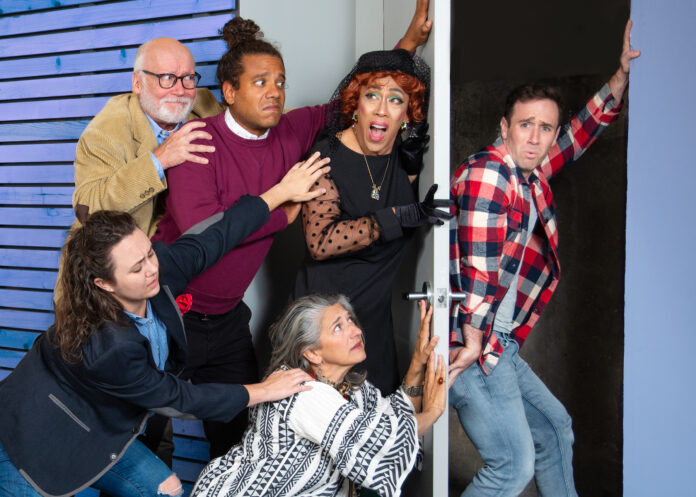
“Aunt Jack” is full of surprises.
Playwright Nora Brigid Monahan’s enjoyably overstuffed comic family drama, now in its premiere West Coast production at the New Conservatory Theatre Center, has several genuinely unexpected narrative twists.
That’s a rare treat in theater these days. When was the last time you were genuinely startled by an unexpected character entrance or plot development?
But the biggest surprise of all is the provocative intellectual and emotional engine Monahan has tucked beneath the hood of what at first appears to be a vintage sit-com jalopy. You’ll still feel it revving after the play ends.
“Aunt Jack,” directed by Jeffrey Hoffman, will most likely catch you off guard if you’re part of what Monahan’s younger characters might call the old guard: Baby boomer gays and lesbians like George, Jack and Phyllis, the three loving, concerned parents of a struggling Gen Z son, Norman. (A dialogue reference to the 1970 gay play “Norman, Is that You?” makes it clear that Monahan knows of whom she spoofs).
Norman (Nick Trengrove), underemployed and recently split with his longterm boyfriend, Ian (Ryan Marchand), introduces his new love, Andy (Emily Steelhammer), to the family, leading to a cascade of revelations around sexual fidelity and fluidity.
This unsettles the ostensibly liberal-minded older generation to great comic effect, but—to Monahan’s great credit—is also without uneasiness for the younger queer characters, even as they advocate for shifts in social standards.
George and Jack are paired paragons of late 20th Century out-and-proud identity: George (Jim Rupp) is a one-time firebrand gay rights activist; Jack (Joseph Alvarado) is a famed drag performer who generally sports women’s attire at home as well as work. Both performers do a fine job, rounding out characters who could easily have read as stereotypes.
Phyllis, alas, is somewhat underwritten; a histrionic New York Jewish mother who doesn’t evolve much over the course of the evening. Fortunately, she’s played by Jennifer McGeorge, who underpins her genuinely funny eye-rolls, spit-takes and fist-clenching frustration with an earnest, dithering warmth that effectively contrast with Alvarado’s camp fire.
While fundamentally lighthearted and always pointed toward a happy ending, “Aunt Jack” resists being the oversimplified generations-in-conflict comedy it could have been.
It’s no shocker that the open-hearted Boomers end up accepting the next generation of queers, even if they don’t quite understand them.
But while the relationships between the three younger characters—fraught with jealousies, insecurities and overconfidence—are temporarily tidied in time for curtain call, they are hardly resolved.
One leaves “Aunt Jack” keenly aware that pansexual, polygamous identities pose challenges not only those who consider them askance, but also to those who embrace them.
